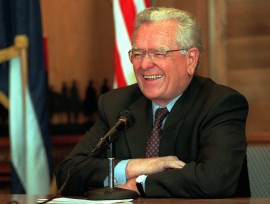CAPITOL REVIEW
Mark Hillman, 15 January 2015
Colorado’s economy has shown remarkable resiliency in the wake of the Great Recession.
Unemployment has steadily fallen from a high of 9.6% in 2010 to an estimated 4.1% in November 2014.
Income indicators roared past pre-recession levels and now both wages and salary and per capita income are significantly higher.
In the past five years, taxes and fees paid by Coloradans to their state government have grown by 43% from $8.5 billion to an estimated $12.3 billion in the current year.
And next year, state revenue could surpass the state’s spending limit for the first time in 15 years, triggering a modest rebate to taxpayers of $116 million or 0.4% of next year’s state budget.
But those in the Government Always Needs More Money Choir just can’t stand this prosperity. They are howling that that this modest refund – and perhaps future refunds, if the economy continues to grow – are somehow strangling our state government.
Remember, these rebates to taxpayers were approved by voters in the Taxpayers Bill of Rights (TABOR) – the same law that requires a public vote on tax increases. Politicians and “the spending lobby” had resisted such limits for years.
Thirteen years after TABOR passed, voters approved Referendum C to correct the one obvious flaw in TABOR by allowing state government spending to rebound as the economy recovers from a recession. Continue reading


 By Dominic Dezzutti
By Dominic Dezzutti






